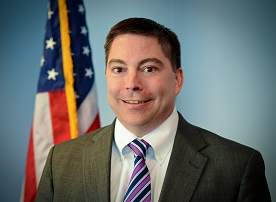FCC's O'Rielly Rips Broadband Privacy Order as Absurd

The smarter way to stay on top of broadcasting and cable industry. Sign up below
You are now subscribed
Your newsletter sign-up was successful
Republican FCC commissioner Michael O'Rielly has lots of problems with the broadband privacy order approved by the FCC's Democratic majority last week, including that while he does not think there is a problem that needs fixing, even if it were a problem the order doesn't even do that.
In that order, the FCC requires ISPs to get their users' informed consent before they can share their web surfing or app use information to third parties. The argument is that ISPs are in a unique position to track and monetize user information.
But in a speech at a Catholic University Columbus School of Law Technology Institute panel, O'Rielly pointed out that since edge providers can continue to collect and share web users' information without getting their permission first, the new FCC restrictions are ultimately "absurd."
"[B]roadband providers remain free to purchase and use the information they need from other Internet companies, including edge providers, because these other companies, not covered by the rules, will continue to operate under the Federal Trade Commission's opt-out regime."
That regime used to apply to ISPs too before the FCC reclassified them as Title II common carriers, which removed them from FTC purview.
"[A]ll that the FCC has really done is to raise the transaction costs, requiring consumers to pay more for heightened privacy rules that they never asked for."
O'Rielly also took aim at the FCC's requirement that an ISP get prior consent even to market new services it is offering—as opposed to marketing services commonly bundled—voice, video, data—for which the FCC agreed consent is implied.
The smarter way to stay on top of broadcasting and cable industry. Sign up below
"[T]here is no rational reason to place undue restrictions on broadband providers. Instead, we should have extended inferred consent to the marketing of products and services offered by providers and affiliates as long as the affiliated relationship is clear to consumers," he said. "As the record demonstrated, consumers expect to receive information from their providers about new products, services, and discounts." In addition, if broadband providers “cannot market new products and services on the same terms as online companies—or even other brick and mortar businesses—there will be less incentive to invest and develop new services.”
The commissioner also challenges the FCC's authority to fit broadband into the telephone privacy regime of Title II. "[I]n its effort to shoehorn broadband into this regime, the Commission is forced to ignore or explain away language that clearly contradicts its position, regulate by analogy, or simply create new obligations out of thin air," he said. "And in that, they did a poor job."
O'Rielly's speech was given before the FCC released the text of the order, in which it rejected the suggestion that the relevant section of Title II (222) applied only to voice or that its "telephone specific references" limited the scope of the section. "[W]hile other subsections specify the duties of 'a telecommunications carrier' in particular situations," the order said, "[t]he term 'telecommunications carrier' has long included providers of services distinct from telephony, including at the time of Section 222’s enactment."
Contributing editor John Eggerton has been an editor and/or writer on media regulation, legislation and policy for over four decades, including covering the FCC, FTC, Congress, the major media trade associations, and the federal courts. In addition to Multichannel News and Broadcasting + Cable, his work has appeared in Radio World, TV Technology, TV Fax, This Week in Consumer Electronics, Variety and the Encyclopedia Britannica.

